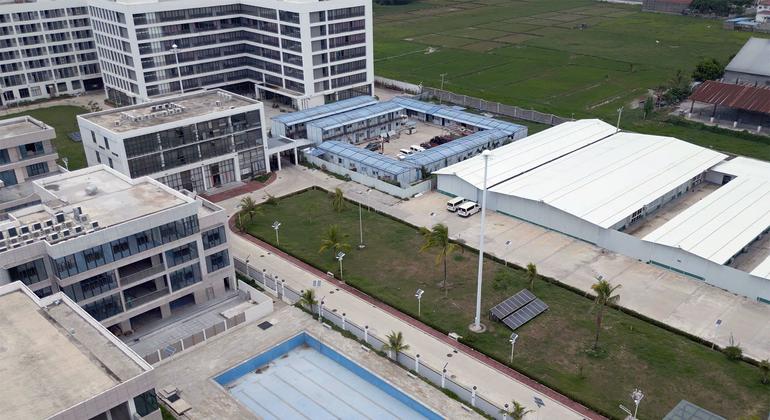Smashing Scam Farms: ‘Criminal Service Providers’ in Southeast Asia

As we reported beginning of the weekThere has been an increase in illegal operations, known as scam farms, following COVID-19 pandemic, across Southeast Asia — including the Philippines — where they often operate alongside legal gambling businesses.
UNODC is supporting countries in the region to cooperate more closely to counter the influence of criminal networks.
Benedikt Hofmann, UNODC Deputy Regional Representative for Southeast Asia and the Pacific, visited a rogue farm in the Philippines that was raided in March this year. He took United Nations NewsDaniel Dickinson is on tour.
Benedict Hofmann: Here in the northern Philippines, just a few hours north of Manila, is an example of a scam farm of this type that exists in many places in the Philippines and across Southeast Asia. We can see the buildings where people work, the canteens where they eat, and the dormitories where they sleep.

Benedikt Hofmann describes the lavish lives of the scam center bosses.
In the middle is a building that houses a gambling establishment, officially registered with the government and inspected by a regulatory body. But what that regulatory body doesn’t see, at least on paper, are the buildings in between.
One of them, which I saw earlier, had computers and workstations, formerly used by Vietnamese workers running scams targeting the Vietnamese market. Another building was for Chinese-speaking workers running scams targeting the Chinese market.
There are houses like the one I’m standing in, where the people who control this complex – the bosses, as they call them – do business and where they relax by the pool with their families.
UN News: Was there anything you saw today that surprised you?
Benedict Hofmann: The scale and sophistication of the complex is astonishing. It looks like a well-established tech company. About 700 people were found in the complex when it was raided in March, which is not nearly as many as other complexes we know about.
Another surprising aspect is the contrast between the lives of those who are often forced to live and work here against their will and the scale of wealth of those who manage this complex.
UN News: How much freedom do workers have?

The scammer’s workplace; the blue text reads ‘increasingly prosperous’.
People who work here are basically cut off from the outside world. All their daily needs are met. There are restaurants, dormitories, barber shops, and even karaoke bars. So people really don’t have to leave and can stay here for months.
Yet even if they wanted to leave, they could not, as we have heard from those rescued from these centres. Some were tortured and subjected to unimaginable violence on a daily basis as punishment for wanting to leave or for failing to meet daily quotas for the amount of money defrauded from victims. There was a lot of human suffering in these complexes.
There are many types of victims, people who are scammed all over the world, but also people who are trafficked here, held against their will and subjected to violence.
UN News: Who is behind these massive operations?
Southeast Asia is the birthplace of the global fraud industry. Transnational organized crime groups based in the region direct these operations and reap the greatest profits from them.

Workers who fail to perform their duties are handcuffed and threatened with fake guns.
They work with a variety of actors, with those who control territory, for example, in Myanmar’s Mekong River border region, or they may work with local power structures.
UN News: What kinds of crimes are being committed here?
Many of the major scam farms in the Mekong region, which borders Thailand, Laos and Myanmar, were originally casinos linked to the region’s laundering of money from drug trafficking and other criminal activities.
But there has been a significant change, especially during the COVID-19 pandemic, as casinos have changed their business models and moved to the online space, especially scams and cyber fraud.
They are essentially becoming crime service providers by providing cybercrime, fraud and money laundering services, as well as data collection and disinformation.

Workers who violate the rules are fined or, more often, beaten.
Technology, like artificial intelligence (AI), is evolving so rapidly that it will really change the way these places operate by creating new opportunities for scammers to make money.
UN News: How should we care about what is happening now and what might happen in the future?
These scam farms are innovation in a way because they are outpacing other parts of the economy and that really doesn’t bode well for the future.
AI expands the scope and scale at which a scam farm can operate. You won’t need a thousand people to run a text-based mobile scam; you just need a well-programmed app to do it for you.
That is a real threat for the future. This is a major concern for us at UNODC because it has the potential to have serious impacts for people all over the world.
UN News: How are countries responding?
There is a growing gap between the rate at which these technologies are being developed and adopted by organised crime networks and the response that governments in the region are able to provide to address these issues. This is a regional issue with global implications. These scams are still predominantly regional, however we are seeing some small pockets of activity in places like South America and Africa.
This is an incredibly complex problem. One country cannot solve it alone, in part because these activities, even if you solve them in one place, will just move to another country where there is less enforcement pressure.
So what is needed is a regional response and UNODC can support that effort. We can bring countries together and help them agree on priorities and strategies to combat organized crime.
UN News: How much political will is there to make it happen?
We are now seeing a strong momentum in the region to work together to address this issue. The Philippines, as well as the countries in the Mekong region and China, are working together, conducting joint activities, discussing priorities and exchanging information on a scale that was not there before. That is very positive.
At the same time, we continue to see a law enforcement-focused response to these issues rather than a more strategic whole-of-government response. The more countries cooperate, share expertise and information, and the more countries in the region receive support from other countries around the world and organizations like UNODC, the better prepared they will be to address this issue.
Solving this problem is going to be incredibly difficult. We are under no illusions that it will take a lot of time, time that we don’t have with this technological change.




